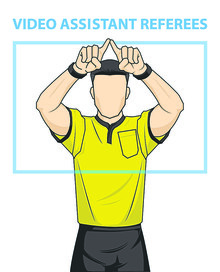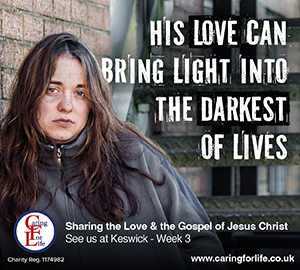VAR and church?
The 2020/2021 Premier League football season will be remembered for the controversy which has been caused by the introduction of VAR – video assistant referees.

The referee at pitch-side, to help assess whether there has been foul play or some other infringement of the rules of the game, can review videos of an incident. A central hub at Stockley Park, West London, monitors all footage and can draw the referee’s attention and positively influence decision making.
All this sounds like a good idea. But many players, fans and pundits have come to the conclusion that it is ruining the game. Do we really want players ruled off-side by a fraction of a centimetre? Should penalties be given for handball when a defender could not possibly have had time to get his arm out of the way of a ball kicked from close range. Writing in the Telegraph, referee Keith Hackett said: ‘It is taking control and taking authority from the on-field official and that cannot be right. Fans are asking, who is running the game now?’ It is not that the video footage isn’t helpful. But it is beginning to dominate. A servant is becoming the master. Some rethinking is required.
Safeguarding
Safeguarding in churches is of immense importance, both for the sake of children and adults. There have been too many people deeply damaged, not only by the more serious and criminal forms of abuse, but by mistreatment from bullying and manipulative leaders. We need safeguarding in churches.
But, just as with VAR in the Premier League, the churches must rethink. What procedures and structures would both honour the authority of eldership within a church, but at the same time maintain a proper independence for safeguarding officers?
This needs addressing, not only as an occurrence of spiritual abuse an urgent matter, but because there have been occasions where safeguarding officers have sought to wrest control from church leaders. Suddenly, everything in the life of the church is a safeguarding issue which must be exposed to minute scrutiny, and if the elders raise a question about this it is immediately seen as evidence that they have something to hide. It changes the whole ethos of a church. Instead of love and peace, there is a sense that some ‘big brother is watching you’.
The relationship between elders and those charged with safeguarding must not become a power game. Churches need to work this through, and find agreed procedures, especially when an elder comes under suspicion (1 Tim. 5.19, 20). Would an agreed set of mutual expectations between the church members and the leaders be helpful? Within a Biblical framework, all would know what elders expect of members and what members expect of elders. This should be agreed by everyone and made explicit to those joining the church, or those becoming leaders in the church. It’s a suggestion.
Independent enquiry?
There are independent agencies which have done exceptional pioneering work in looking at problems of abuse in churches. They have made a sterling contribution. Sometimes these expert agencies are invited in to a church where there have been problems to investigate and make recommendations, often with great insight.
However, the questions must be asked: ‘Who are these agencies accountable to?’ and: ‘Isn’t it possible that they too will have their own agendas?’ Could they, almost inadvertently, come to dominate the church scene just as VAR is dominating football at present? Certainly they often do not answer to any church or group of churches for they are frequently non-denominational. This is not to denigrate their work in any way, but simply to point out where possible problems may arise.
It is here that groups of churches or associations can have a strength. Sister churches, of the same faith and order, can provide knowledgeable and loving, yet independent help to a troubled church with all parties listened to, not just the eldership. The dangers of a church being totally independent of all other churches are apparent. Associations would need to agree Biblical procedures where there is both help given and accountability to the churches as a whole.
With great thoughtfulness, one pastor I know, being the only elder in his church and aware that he could make mistakes, set up a system whereby his church members could call the pastors of two nearby friendly churches, if they thought he needed challenging. It was wise, humble and helpful.
John Benton is Director of Pastoral Support at The Pastor’s Academy, www.pastorsacademy.org



